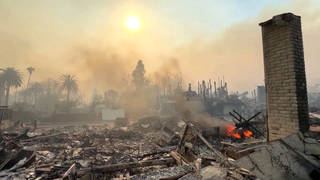
As President Obama declares federal disaster areas in New York and New Jersey before full damage assessments are completed, we speak with Henia Belalia of the group Peaceful Uprising in Salt Lake City, Utah. “To think that less than a week away from presidential elections there is a climate silence and a lack of initiative in terms of linking what’s happening with our climate to our human activity and to our inhumane addiction to oil is absurd and, at best, laughable,” Henia says. [includes rush transcript]
Transcript
AMY GOODMAN: This is Democracy Now!, democracynow.org, The War and Peace Report. I’m Amy Goodman. I just want to again say to people, we are broadcasting in a very unusual, stripped-down way today. Democracy Now!'s studios are in the dark, though our colleagues spent the night there last night, as hundreds of thousands of New Yorkers are in the dark right now. We happen to be broadcasting from Salt Lake City, Utah, as we've been on this 100-city tour.
This is breaking news, President Obama declaring a federal disaster area in New York City, Long Island, in eight counties in New Jersey, the declaration making federal money available to people in the area. The American Red Cross says 11,000 people spent Monday night in 258 shelters across 16 states.
Usually for our viewers on television, we will be showing all of the video of what’s taking place, but we have no access to that right now. And for our radio listeners, we are linked up by a phone connection to Pacifica Radio and to National Public Radio, which is why the show sounds different than it normally is, but this day is different.
It is—we are going, in a minute, to go to Arnie Gundersen. Many people are concerned about the nuclear power plants on the East Coast. Arnie Gundersen is one who has worked in nuclear power plants for years. He’s in Vermont. But before we do that, right here in Salt Lake City, we’re joined by two guests. I should say, yesterday I was in Medford, Oregon, on my way to Salt Lake City, and in the airport I met a reporter. She was doing a special on the Red Cross. They were appealing to people in Oregon to give blood because of, well, the crisis on the East Coast, and they can’t get the normal blood supply that they would usually get on the East Coast. But I’m joined here by two guests. I’m joined in Salt Lake City by Henia Belalia. She is director of Peaceful Uprising. And I’m also joined by Hans Ehrbar, who is a professor of economics here at the University of Utah in Salt Lake City.
And I want to welcome you both to Democracy Now! Henia, let’s start with you. Talk about the effects of climate change that you are most concerned about, as we hear these descriptions of what’s taking place in New York and along the Eastern Seaboard.
HENIA BELALIA: Sure. Well, when we talk about climate change, it’s—we’re talking about the environmental degradation, as has been highlighted by some of our—some of your guests here today. And we’re also talking about a deep human rights issue. As environmental degradation is exacerbated, we’re seeing, as well, in parallel, an exacerbation of social, racial and economic inequities. When we’re looking at who the most impacted communities are, before Hurricane Sandy even hit our shores, over 35 people had been proclaimed dead in the Caribbean. And—
AMY GOODMAN: In fact, I think that number is now over—now over 60.
HENIA BELALIA: Has grown.
AMY GOODMAN: We spoke to Patrick Elie in Haiti yesterday.
HENIA BELALIA: Right. So, to think that less than a week away from presidential elections there is a climate silence and a lack of initiative in terms of linking what’s happening with our climate to our human activity and to our inhumane addiction to oil is absurd and, at best, laughable.













Media Options